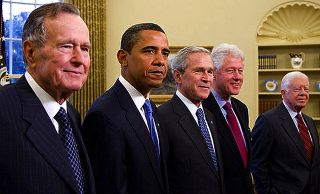A Psychologist's Open Letter to U.S. Voters

Dear Fellow Voters:
I've been watching all the presidential candidates with great interest — and deep concern. Concern for us. Concern for the fate of our country. Concern for our world.
As an expert on narcissism, I'm not especially worried that narcissists might make it to the White House. According to research, they've always been there. And that shouldn't scare us anyway, because just to be clear: narcissist is not a diagnosis. It never has been. Narcissists are people higher in narcissistic traits than the average person, and while they may or may not be disordered, they all share one thing in common: they feel special. Some feel special enough to lead a nation, in fact.
So what we should be far more concerned about is not whether or not politicians are narcissists — most are — but how healthy they are. And that's where you come in. You have the power to shape the future of this country.
Politicians are groomed by us — by our applause, by our polls, by our votes. Whatever you seem to love or hate, they'll embrace or reject. So be careful what you applaud or attack. That what they — and all the little future leaders watching them — will think you want in a leader.
That's why this won't be another rant about Donald Trump being a narcissist because: a) Did you really need an expert to tell you that? and b) We don't need another article or book about obvious narcissists, because apparently we're pretty good at recognizingthem already.
Instead, I offer a guide, based on research, for what keeps leaders healthy, so you can applaud the right behaviors, and — I hope — punish the dangerous ones.
People high in healthy narcissism inspire without undermining; they lead with conviction not cruelty; they bring out the best, not the worst in people around them. That's who we need leading the nation, so here are some dos and don'ts:
- Do applaud careful reflection. Please, for all our sakes, stop making politicians worried, on either side, that changing their minds when they have new information will be viewed as a weakness. Ditch the reflexive and empty attacks on people for "flip-flopping." When someone gives careful reasoning behind changing their position, it's not weakness; it's strength. It's called thinking. Weakness is barreling into a brick wall because that's the direction you first chose to head in — and, dammit, you stay the course. Want to know who worries most about seeming infallible at all costs? Extreme (unhealthy) narcissists.
- Don't applaud insults. There's a dead giveaway that extreme narcissists use to cover their insecurities: putdowns. Like the schoolyard bully who beats people up to feel stronger, extreme narcissists hurl insults when they feel threatened; they name call, insult, denigrate. It's not clever and it's not mature. We therapists have a name for it: emotional abuse. It doesn't belong on the playground, and it certainly doesn't belong in the White House
- Do applaud feelings. The world's going down in flames for sure if we choose unflappably stoic — read, insensitive — leaders who never seem to shed a tear or get choked up over anything. Who never seem openly moved by the plight of victims. Who disparage crossing party lines to offer or accept a hug in times of crisis that can — and should — bring the nation together. Extreme narcissists are emotion-phobes because they don't trust people to support them (a problem called insecure attachment). So they rarely show sadness, fear, loneliness, worry, shame or guilt. They just get angry or attack or become — you know, stoic. We don't need someone who collapses in tears constantly but, if you want good leaders, be aware that emotion is a basic job requirement.
- Don't applaud manipulation. Disordered narcissists betray three telltale signs: empathy-impairment, entitlement, and exploitation. If someone openly brags about paying others to do their bidding, they don't view people as fellow human beings, but chess pieces. And it's only a matter of time before you become the sacrificial pawn. Blatant manipulation isn't a guarantee that someone has narcissistic personality disorder, the most extreme form of unhealthy narcissism, but it sure is a terrible sign.
- Do applaud collaborative behavior. Extreme narcissists don't like to be influenced because it makes them feel weak. It's the same reason they flee any hint of vulnerable feelings. They don't trust that anyone will be there for them. So instead of working with others, they get combative, argumentative, and shout people down. They talk when they should listen. They're so invested in seeming perfectly self-sufficient that they dread listening to anyone else, which is another giveaway of extreme narcissism. It's only a matter of time before they grow deaf to what we, as a nation, are feeling.
- Don't applaud black and white thinking. We need leaders who can see the nuance in situations, who don't collapse the world into simple categories. In mentalhealth, black and white thinking is known as a "cognitive distortion," not a great habit in a leader. Extreme narcissists love to divide the world this way because they never have to feel vulnerable. They can flee or attack anyone who makes them feel unsure of their special status as "enemies" and cozy up to everyone else who bows to their will as "friends." Be very careful that you don't punish leaders for seeing the gray around them. People who think this way eventually draw up a list of enemies — and one day, you may find yourself on it.
- Do applaud apologies. All humans make mistakes. But extreme narcissists are so addicted to feeling special — often by seeming perfect — that they can't admit to even the simplest errors, let alone apologize for hurting others. Thanks to us, many politicians have gotten it into their heads that somehow, saying they're sorry or acknowledging their mis-steps — unless they're forced to by, say, an impeachment process — makes them seem weak. Hence the deplorable habit of making excuses for the most egregious behaviors. What keeps people from slipping into disorder is the capacity to repair relationships — whether the bond is with their partners or a nation. Put someone in office who can do that, please. Cheer for the candidate who can say "I'm sorry" without the pressure of a court order.
- Don't applaud evasiveness. Shallow, vague, glib responses are something extreme narcissists excel at, especially the extroverted types who seek power. Their speeches are all show with no substance; a bunch of bluster without the details to back it up. No matter how confident the speaker, this kind of leadership isn't going to help anyone — except perhaps the narcissist. The devil is in the details, or in this case, the devil is in the lack of details.
- Do applaud curiosity. Smart leaders — and I've met a few in my time — actively explore. They ask good questions. They don't always have answers and they let you know that. Their strength lies in their conviction that they'll solve a problem, not the certainty that they already have. They keep investigating the world if they're not sure where Russia is on the map. Beware the leader who's more invested in appearing to have all the answers than asking the right questions. It's a sure sign that someone's more concerned with feeling special than helping you.
It's up to you, America.
Narcissists will always be drawn to politics. But you have the power to make sure the narcissist in the Oval Office, as well as in any elected position in the country, isn't so addicted to feeling special that they forget the needs of the people who put them there in the first place.
P.S. Don't forget to vote!
Best,
Dr. Craig Malkin








No comments:
Post a Comment